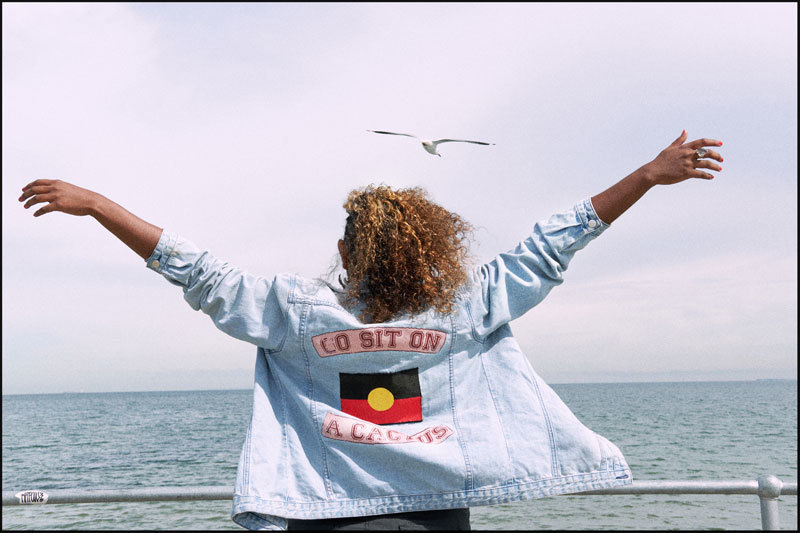This year tens of thousands of people nation-wide took to the streets to protest Australia Day, a date that commemorates the beginning of an era of genocide and colonisation. In Naarm (Melbourne) alone, fifty thousand individuals marched through the heart of the city in opposition. Later that day A.B Original’s anti national-pride song26 of January landed at number 16 on Triple JJJ’s Hottest 100. The track was broadcasted to millions of young people around the country, providing a thought-provoking soundtrack to countless backyard barbecues.
Though there’s much to fix and heal, it’s clear something is changing. There’s been a proactive shift in this generation’s awareness of Indigenous issues as young Aboriginal voices ring out louder in their appeal for visibility, respect and progress. These voices speak of a growing sense of identity and understanding of their rights. After two hundred years of silencing and oppression, it’s their turn to speak.
We talked to some of these emerging young voices to learn more about their views on politics, the internet’s role in activism and what being Aboriginal represents to them.
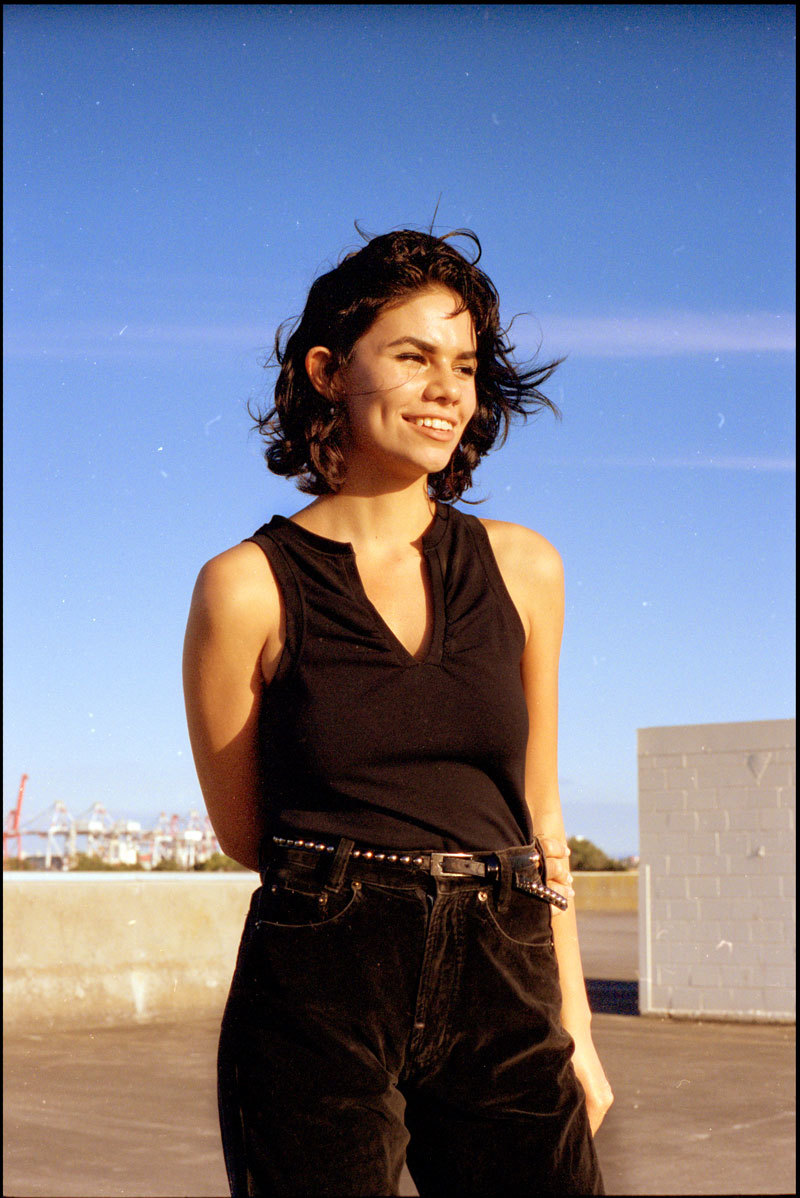
What does being Gumbaynggir represent to you?
I feel pride. There’s so much stigma about being Aboriginal — like it’s taboo or you should feel ashamed of yourself. Pride and confidence in your cultural heritage is so important. Depression amongst Aboriginal youth is soaring and I think part of it is that they’re not allowed to talk about their culture or feel pride in who they are and where they come from. To me, being able to say “I am Gumbaynggir” means cultural pride.
What inspired you to speak at this year’s Invasion Day protest?
My nan is a huge role model for me, and she is part of the stolen generation. She was never given a voice , she didn’t go to school and she wasn’t allowed to speak. When she was 16, exactly my age now, she was force-removed from her community and she was moved into the city and made into a house maid. She always wanted to be political and outspoken but was forced to remain silent, so I wanted to speak for her, because she never had the chance to do it herself.
How have you been politically engaged recently?
Last year I did the first NAIDOC assembly at my school with the few other Aboriginal students there. I go to a very white school — and that’s not an insult, that’s a fact — so even them being interested in my culture was important. I mean, in all of our history textbooks are two pages on Aboriginal history — a picture of a dark-skinned person holding a boomerang — and that’s it, that’s my history. Then 200 pages dedicated to white history. We need to reform the education system if we are going to do things right.
How can young, non-Indigenous people be better allies?
Aboriginal people are sick of being talked about — in parliament, in schooling systems, everywhere. We want to be talked to, we want to be part of the discussion, we have so much to say and we have been silenced for so long. So in all honesty, my advice is to just shut up and listen.
How is the current activist movement different from previous generations?
I feel like we have a sense of obligation to fight for our parents, grandparents — our Ancestors. The previous generations were still amidst terrible oppression as slaves or part of the stolen generations so they couldn’t actually resist — they didn’t get a chance to fight. I feel like now we are acting for them and demanding change.
Who would you like to see in leadership of this nation?
I love politics and I would love to see more Aboriginal people in parliament. Not just in a tokenistic way, though. It’s easy to get an Aboriginal person in Indigenous affairs, but I want to see them involved in all aspects — dealing with foreign affairs, economic issues and agendas, cultural programs. Prior to colonialism Indigenous people had really advanced knowledge in botany, astronomy and science. We know the land better than anyone else, get us to look over environmental issues at least. Get us involved.
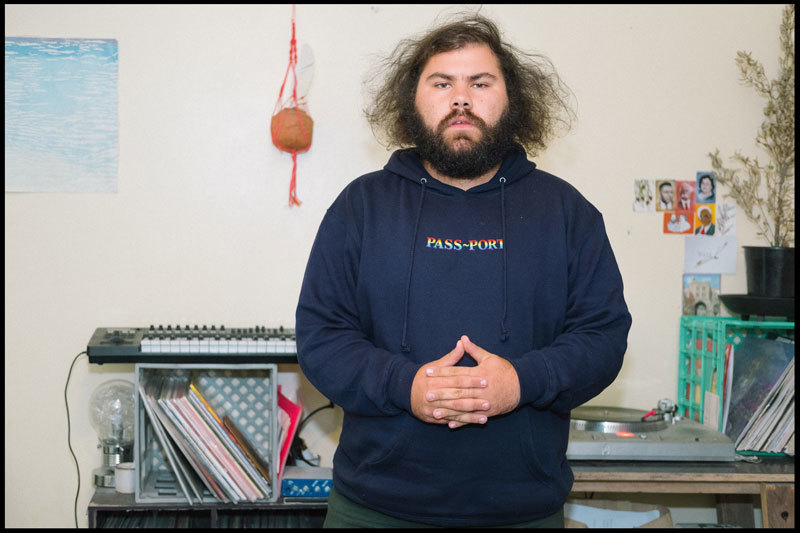
What does being Gunai/Kurnai represent to you?
I think it’s a privilege for me to know where my country is, specially knowing my language clan group Krauatungalung. Many mob out there don’t know where they are from. I mean, I see it as a privilege but it’s actually a right. To me being Gunai/Kurnai means strength and resilience and it shapes my identity.
What are some recent positive changes regarding Indigenous issues?
Something that’s really positive within the First Nations and Indigenous rights movements is seeing a lot more young people finding the importance in speaking up and discovering their rights through activism. For me, activism was something I had thought about throughout high school but I didn’t really do until I was 22. It’s important for us to understand that it’s our future and to acknowledge the Elders that paved the way for us to continue to create better paths for the younger generations.
How do you incorporate your activism into your career as a music teacher and electronic producer?
The last month and a half I’ve been teaching at a youth justice centre with boys. I’m very passionate about the forms of activism that it takes to build those boys up, specially the Indigenous Koori boys in juvenile prisons. It’s a system that doesn’t have too many people that they [can see] as cultural role models. So me being there teaching them music in itself is an important thing for them to see.
In addition, as a DJ I always open my sets with an acknowledgement to country no matter what type of gig it is. I’m willing to sacrifice a really upbeat vibe created by a previous DJ. In general, I want to be able to work with as many Aboriginal artists as I can. If there are any Aboriginal artists out there that want to collaborate please hit me up.
How is the current Indigenous youth activist movement different from previous generations?
The Elders had a more fucked up system to deal with. What they were doing was limited by what they were allowed to do in those times. Now, I’m not saying things are better but there is a bit more fluidness and flexibility within our activism. We can sort of specialise: like choosing to protect country, or joining social movements. The internet has also helped us a lot. When I was in high school I don’t remember hearing about Indigenous activism. I would see it on the news every now and then, but now things are happening faster and we are more connected and can do things more frequently.
Who would you like to see in leadership of this nation?
I don’t know. It depends on which nation you are talking about, there are many nations in this continent. I don’t think I would like to see anyone leading this nation, it shouldn’t be one person. It shouldn’t even be the system that it is now. If I had to choose someone though, I guess maybe my sister Nayuka Gorrie or every Aboriginal woman in this country. I would like to see them running this continent.
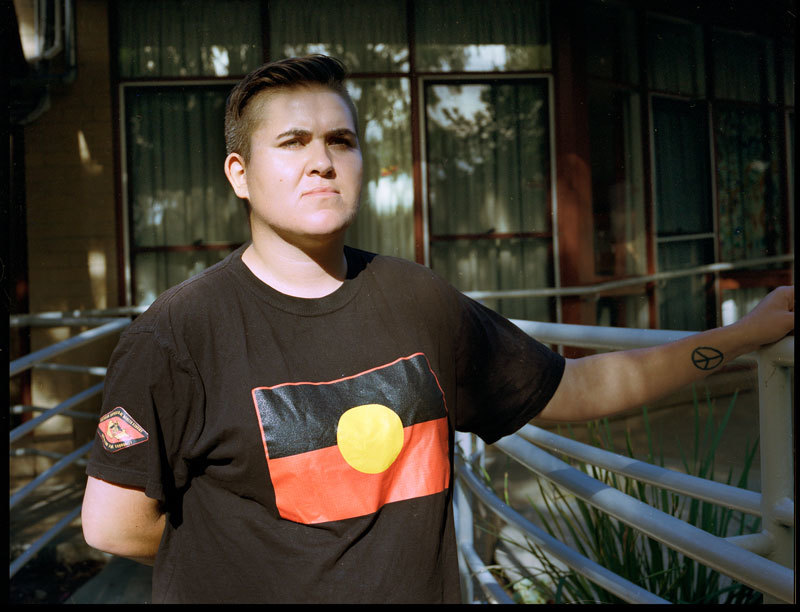
What does being Gunai/Kurnai represent to you?
It means that I’m very proud of who I am. I think it’s important to have any kind of culture connections and also I think it’s good to have something to pass along.
How do you incorporate your activism into your workplace ?
As a case manager I try to empower our Elders with knowledge and information that will keep them strong, proactive and safer within their own homes for longer. For example, if the Elder has issues with housing I will advocate for them, but at the same time ensure the Elder is armed with the right information to make sure that if that issue comes up again there are resources for them to deal with the issue themselves. The program is about ensuring the Elder is kept independent and informed of the resources out there available to them. Knowledge is power.
Who would you like to see in leadership of this nation?
My sister Nayuka Gorrie who is a proud feminist and a dedicated protector of our people’s rights. She has the knowledge and the dedication to our people that I feel we need within our country as it stands now.
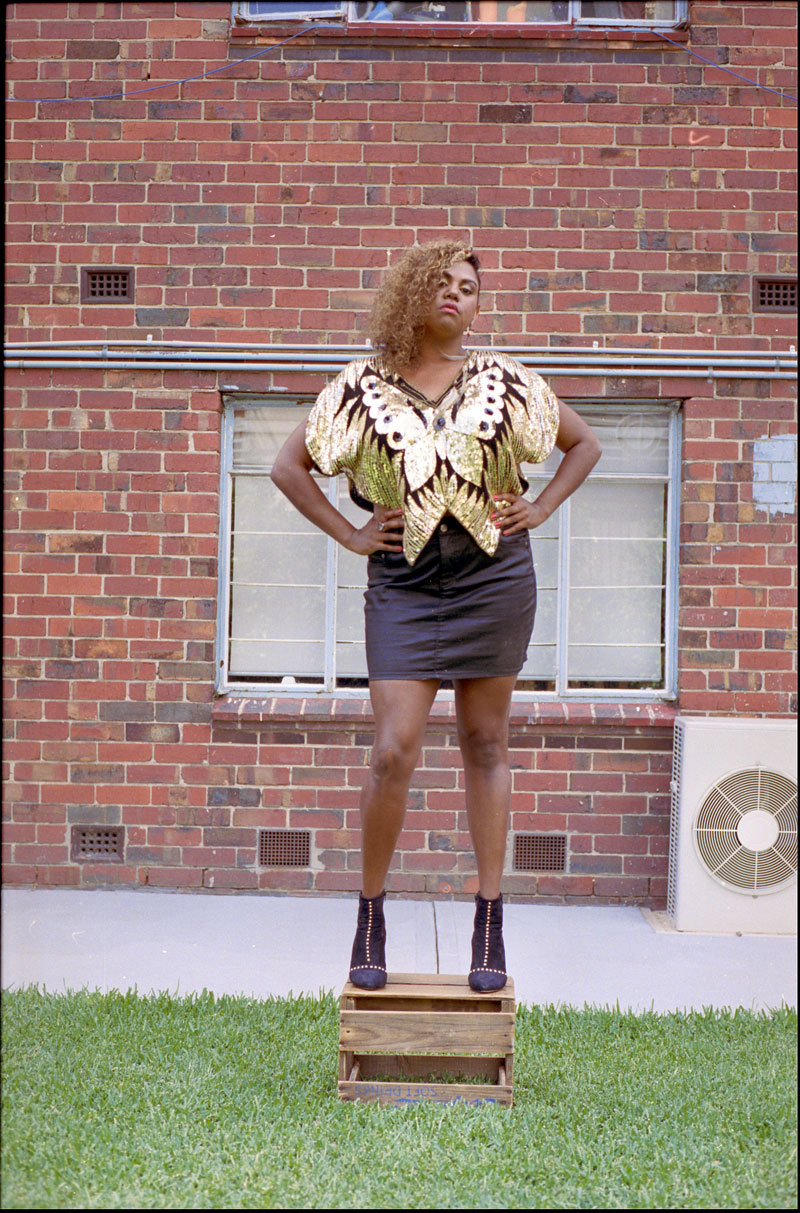
How do you bring your activism into your career as an artist?
I believe the voices and the stories of my people need to be heard and seen more across all forms of creative expression. Being an Aboriginal woman is a political statement in itself. My very existence is resistance to genocide and colonisation. My very existence threatens the Australian way of life. I’m a walking, talking political reminder of all the terrible things Australia has done and continues to do. All of my work is informed and inspired by my people and our history, you can read this in my poetry, listen it in my songs and see me perform it through my plays.
How did it feel to speak in front of 50,000 people at the latest Invasion Day protest?
As I sat there with my niece by my side on Kulin country — in the middle of Flinders and Swanston street — in the midst of fifty thousand people listening to the deadly brothers and sisters speak, I asked the ancestors for help. I had been sick with a cold, fever and laryngitis for the last week in bed, with no voice. I called upon them and said a prayer. “Please help me, give me my voice back and give me strength to get up and speak.” I got up with the strength of our ancestors and all the mob there, and around the country who were also protesting. To my surprise, I had a voice. I began to speak. I listened to our ancestors and all mob and spoke from my Gii and my Dhuwi (Gamilaraay word for heart and soul/spirit.)
What does Invasion Day represent to you?
Invasion Day always comes with mixed emotions for me and many of my people, it’s a day for us to come together to acknowledge those who fought before us. It’s a day for us to celebrate how far we have come, and it’s a time where we gather to speak of changes that still need to happen.
What’s the significance of the soap box in your portrait ?
I chose to use the soap box for this photoshoot because I feel like it still has great power in leading and creating change for our people. When [standing] on a soap box our mob speak of great change needed, of hardship and of actions that have shaped our history as we know it. The soap box created a platform for our voices to be heard. I feel it’s important to acknowledge and remember those who have fought for what we have today and what we still continue to fight for.
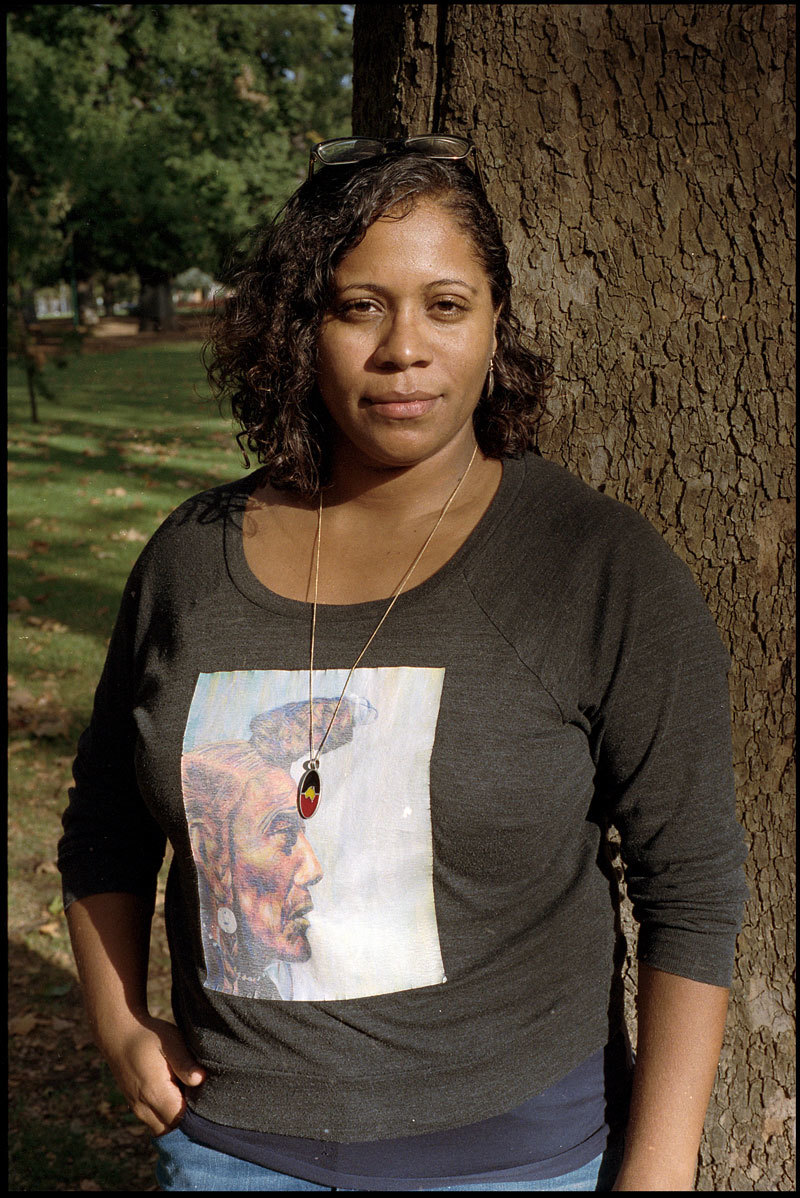
What’s the most damaging misconception this country has about Aboriginal people?
There’s still an insurmountable amount of mysticism and tokenism surrounding Indigenous people and culture. A lot of it stems from misinformation and misconstrued, or rather ignorant ideas about what Indigenous culture and people represent. Aboriginal people are not here to be your token Indigenous friend or colleague. We are human beings and should not have to justify or plead for our own humanity. We are not here to do the emotional labour for you. We are not here to challenge and deconstruct your ignorance only to have you revert to your privilege and rage with your old fears and prejudices. We do not exist to cater towards your own fragility or the micro aggressions you uphold to exclude and separate Indigenous people, or people of colour, from the mainstream narrative and conversation.
Some of the most damaging ideologies are the ones that uphold the complete eradication of our history, of our culture, of our voice and of our people. The damage comes from the ongoing willingness to whitewash and tone police the ugly and bloody truth that exists within the foundations of White Australia.
How is the current Indigenous youth activist movement different from previous generations?
Everything we do is about building and maintaining our legacy. Our youth are the next generation of game changers and as a result, they are aware of their responsibility to uphold and maintain the ancestral fires of our Ancestors. We are running out of time. Our people are dying at astronomical rates. What our youth are realising is that to impact the mainstream sector, to challenge the grand narrative and to help build upon our legacy you must get your qualifications. This education helps to shift the paradigm and create the opportunity to not only obliterate archaic narratives but also help platform the voices of our people.
I see an empowered and unapologetic activism that helps to raise the collective consciousness. We are not that different from our predecessors and are only building upon their activism. It’s imperative we maintain the resistance and are aware of our responsibility to never allow a level of complacency to manifest in our ongoing fight for equality, justice and truth. We cannot afford to settle because the next generation is watching.
How can young, non-Indigenous people be better allies?
To be an ally you must be willing to listen, truly listen. As an ally I will challenge everything you think you know about Indigenous people. Whether consciously aware of a bias or not, you must be willing to be brutally honest about your individual perception and relationship towards Indigenous people.
As a direct result of the foundations of White Australian ideals, ideals that are very much indoctrinated into upholding a particular elitism and power over Indigenous Australia, I want you to challenge the grand narratives that continue to perpetuate false ideologies about the history of Aboriginal Australia and the Australia that exists today. This country continues to sit on an unsettling and highly disturbing bed of untruths surrounding the 229 years of colonial occupancy and control that Indigenous Australians are still having to navigate, negotiate and challenge on a daily basis.
Your awareness to our truth will help shift the perspective lens and change the landscape. Only through education and awareness will you be able to deconstruct this elitism and power for yourself and within the wider community.
To be an ally is to learn to stand beside me, not in front of me.
These interviews took place on the stolen land of the Kulin Nation. Sovereignty was never ceded.
Credits
Text Triana Hernandez
Photography Tasha Tylee
